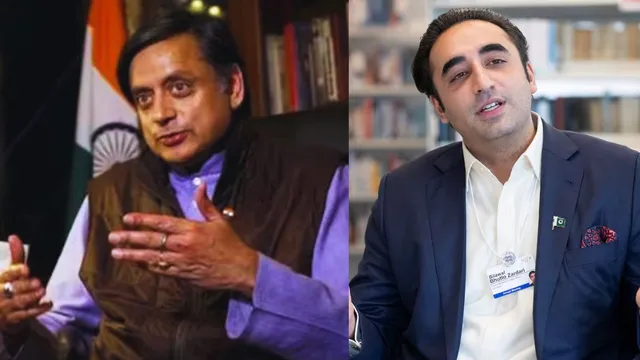- By Supratik Das
- Mon, 19 May 2025 01:22 PM (IST)
- Source:JND
In a dramatic diplomatic standoff, Bilawal Bhutto vs Shashi Tharoor has quickly emerged as the buzzword on the international stage as both India and Pakistan launch high-profile delegations to advocate their respective narratives on terrorism and regional stability. But as comparisons are made, experts maintain that the difference between the two politicians couldn't be starker. While India’s move to expose terrorism networks and present a strong anti-terror stance internationally, Pakistan’s response, fronted by Bilawal Bhutto Zardari, is being dubbed a “copycat attempt”.
As part of its effort to counter global misinformation and highlight India's policy of zero tolerance on terrorism, the government has dispatched seven all-party delegations of Indian MPs to over 30 partner countries. This global outreach follows the Pahalgam terror attack, carried out by Pakistan-based terrorists on April 22, that claimed 26 lives. In response, the Indian Army launched Operation Sindoor on May 7, targeting terror bases in Pakistan and Pakistan-occupied Jammu and Kashmir (PoJK). Over 100 terrorists affiliated with Jaish-e-Mohammed, Lashkar-e-Taiba, and Hizbul Mujahideen were eliminated. India also carried out coordinated airstrikes that damaged military infrastructure across 11 Pakistani airbases. The seven delegations will visit Saudi Arabia, Kuwait, Bahrain, Algeria, the UK, France, Germany, the EU, Italy, Denmark, Indonesia, Malaysia, Korea, Japan, Singapore, the UAE, Liberia, Congo, Sierra Leone, the USA, Panama, Guyana, Brazil, Colombia, Spain, Greece, Slovenia, Latvia, Russia, Egypt, Qatar, Ethiopia, and South Africa.
Shashi Tharoor's Global Credibility vs Bilawal's Rhetoric
While India's attempt is driven by a democratically supported, multi-party consensus, Pakistan's team is essentially perceived as army-driven. India's selection of Shashi Tharoor, a former UN Under-Secretary-General and four-time Congress MP, has been seen as a masterstroke. Tharoor leads a cross-party delegation with leaders from the BJP, DMK, Shiv Sena, and others demonstrating India's collective stand against terrorism. Meanwhile, Bilawal Bhutto, who has long been criticised for his rhetoric as much as for being rhetoric-free on the issues of Kashmir and water conflicts, is coming under attack even among Pakistan's political class. “Bilawal Bhutto’s political effectiveness is compromised and guided by Pakistan’s military, while Shashi Tharoor’s strategic clarity, bipartisan support, and ability to frame India’s stance on terrorism position him as a far more effective representative. Bilawal, on the other hand, struggles to reconcile Pakistan’s dual identity as both a victim and aggressor," an analyst of South Asian geopolitics said this to News18. “His speech may end up being rhetoric without facts," he added.
Recommended For You
Tharoor's Strategic Advantage
Tharoor's credentials, chairing multiple parliamentary committees to serving in the Ministry of External Affairs, make him a seasoned diplomat. His ability to frame India’s policy and expose Pakistan-sponsored terror with facts lends credibility to India’s outreach. In the meantime, Bilawal's orations have been mocked several times in the past, with many criticising his lack of depth, data, and diplomacy. "His words are usually incendiary. That's not how peace is described," the analyst said to News18.






